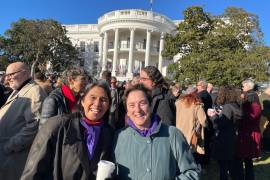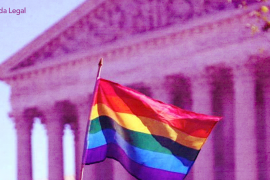
What Happened Today at the Supreme Court
Blog Search
What a day! After decades of work by Lambda Legal and many others, we have at long last secured the freedom to marry for all same-sex couples throughout the entire United States. Today’s moving and inspirational decision in Obergefell v. Hodges is one for the history books. Here are five important things to know about the decision:
1. As a result of today’s decision, no government body or official in any state or territory may deny a same-sex couple a marriage license or refuse to treat their marriage equally in any respect. As Justice Kennedy wrote in his stirring majority opinion, “the right to marry is a fundamental right inherent in the liberty of the person, and … couples of the same-sex may not be deprived of that right and that liberty.”
While there may be pockets of resistance, they will not last long. Any government official who interferes with these rights faces the likelihood of being sued and being held personally responsible for damages and attorneys’ fees. If you have trouble obtaining a marriage license; are denied recognition of your marriage by a business, your employer, an insurer, or state or local authorities; or otherwise experience discrimination based on your sexual orientation, gender identity or marital status, we want to hear from you. We today have launched our “Marriage Equality Tracker” to make it possible for anyone experiencing such problems to confidentially let us know so that we can mobilize into further action.
2. Today’s decision rests on the building blocks of prior LGBT rights victories and of other key civil rights precedents. Indeed, June 26th is sure to stand out forever in the history of the LGBT rights movement in America. Twelve years ago on this very day in 2003, Lambda Legal won Lawrence v. Texas, putting an end to state laws that made lesbian and gay people criminals for having private intimate relationships. Today’s decision repeatedly relies on that victory. Here’s one example: “As this Court held in Lawrence, same-sex couples have the same right as opposite-sex couples to enjoy intimate association. Lawrence ... acknowledged that ‘[w]hen sexuality finds overt expression in intimate conduct with another person, the conduct can be but one element in a personal bond that is more enduring.’ … But while Lawrence confirmed a dimension of freedom that allows individuals to engage in intimate association without criminal liability, it does not follow that freedom stops there. Outlaw to outcast may be a step forward, but it does not achieve the full promise of liberty.”
In addition, two years ago on this very day in 2013, the Supreme Court decided United States v. Windsor and struck down the core of the so-called “Defense of Marriage Act.” As court after court recognized over the past two years, the principles enunciated in Windsor compelled today’s outcome. Like Windsor, rather than depending upon a particular tier of judicial scrutiny, today’s decision rests on basic principles of liberty and equality and the underlying constitutional promise to all of “equal dignity.” Today’s majority opinion explains: “No union is more profound than marriage, for it embodies the highest ideals of love, fidelity, devotion, sacrifice, and family…. As some of the petitioners in these cases demonstrate, marriage embodies a love that may endure even past death…. Their hope is not to be condemned to live in loneliness, excluded from one of civilization’s oldest institutions. They ask for equal dignity in the eyes of the law. The Constitution grants them that right.”
Today’s decision also rests on other legal landmarks that advanced racial justice and reproductive freedom, including Loving v. Virginia (which struck down bans on interracial marriage) and Griswold v. Connecticut and Eisenstadt v. Baird (which protected rights of both married and unmarried individuals to access birth control). There is an important lesson there. All struggles for justice, liberty and equality are connected. And, thus, even as we celebrate this historic victory for same-sex couples and their families today, our thoughts are also with the families in Charleston and across the country who are mourning Rev. Pinckney and the other eight people murdered last week. We must ever remember that violence, hatred and inequality directed against any of us harm every one of us.
3. The Obergefell decision will stand as a beacon for our nation’s continuing evolution toward greater equality, liberty and justice for all. It explicitly rejects the notion that, just because there was a tradition of excluding individuals from protected rights, that somehow justifies perpetuating the exclusion. The decision also wisely raises a palm in the face of the argument that the historical definition of marriage as between a man and a woman is somehow immune from constitutional attack. (Something that had to be true, given that the Windsor decision struck down the federal “definition” of marriage.) As Justice Kennedy writes, “If rights were defined by who exercised them in the past, then received practices could serve as their own continued justification and new groups could not invoke rights once denied. This Court has rejected that approach, both with respect to the right to marry and the rights of gays and lesbians.” Echoing words from Lawrence, today’s decision reaffirms the Constitution’s promise to live up to the challenges of the present and future and not be mired in past failures to appreciate exclusion and oppression: “The nature of injustice is that we may not always see it in our own times. The generations that wrote and ratified the Bill of Rights and the Fourteenth Amendment did not presume to know the extent of freedom in all of its dimensions, and so they entrusted to future generations a charter protecting the right of all persons to enjoy liberty as we learn its meaning. When new insight reveals discord between the Constitution’s central protections and a received legal stricture, a claim to liberty must be addressed.”
4. Today’s decision provides critically important protections to children as well as adults. Justice Kennedy emphasized in today’s decision that “Without the recognition, stability, and predictability marriage offers, [the] children [of same-sex couples] suffer the stigma of knowing their families are somehow lesser. They also suffer the significant material costs of being raised by unmarried parents, relegated through no fault of their own to a more difficult and uncertain family life. The marriage laws at issue here thus harm and humiliate the children of same-sex couples.” Our opponents often talked about protecting children, but they never explained just which children were helped by not denying same-sex couples the ability to marry. That’s because the answer was “none of them.” I could not feel more proud about how Lambda Legal and all of our colleagues at our sister organizations and all of the private counsel who were our partners and all of the individuals who knocked on doors, opened their wallets, rallied, campaigned and lobbied, bravely came out, spoke their hearts to their families, and engaged their neighbors and coworkers together have made generations to come more secure, more free and more able to live their lives in pride and dignity.
5. Although we celebrate today (and over the weekend, where Pride parades in many cities are likely to be glorious), we are very far from done. There are likely to be many questions about the practical implications of today’s decision. That’s why Lambda Legal, along with our colleagues at the ACLU, Freedom to Marry, GLAD, HRC, and NCLR, launched a joint website –http://MarriageEqualityFacts.org – to provide answers to same-sex couples and their families as they navigate accessing the rights, benefits, and protections that marriage affords.
But marriage has always been just part of Lambda Legal’s and our movement’s very full agenda. We continue to work for equality and justice for transgender people; for people living with HIV; for LGBT youth, seniors and immigrants; for comprehensive antidiscrimination protections; for decent health care; for an end to violence, police misconduct, and mistreatment of those who are incarcerated or detained; and for so much more. We must continue to prevent the creation of religious loopholes that would eviscerate civil rights protections. We need to ensure that we win not just legal rights in principle, but that those rights are accessible to all members of our community in their everyday lives. We need to make sure that no one among us is left behind, as people of color and working class, low income and impoverished people so often have been.
Fortunately, many people believe in us and in continuing to help us win victories as we did in Lawrence and as we, as co-counsel in the Obergefell litigation, did today. John Barham and Dick Auer were generous donors in their lifetime, but their support lives on. As part of their estate, they have made an amazing $1.25 million challenge gift to Lambda Legal. Every dollar raised up to that amount will be doubled. With your help, their gift could mean twice as many victories ahead on the many battles we continue to fight. Say #IDo to being a part of this ongoing work!
This is a glorious day. This landmark decision enshrines our common humanity and dignity. For the first time, LGBT people in America live in a nation that respects our love and our families. Be proud – and carry it forward.




